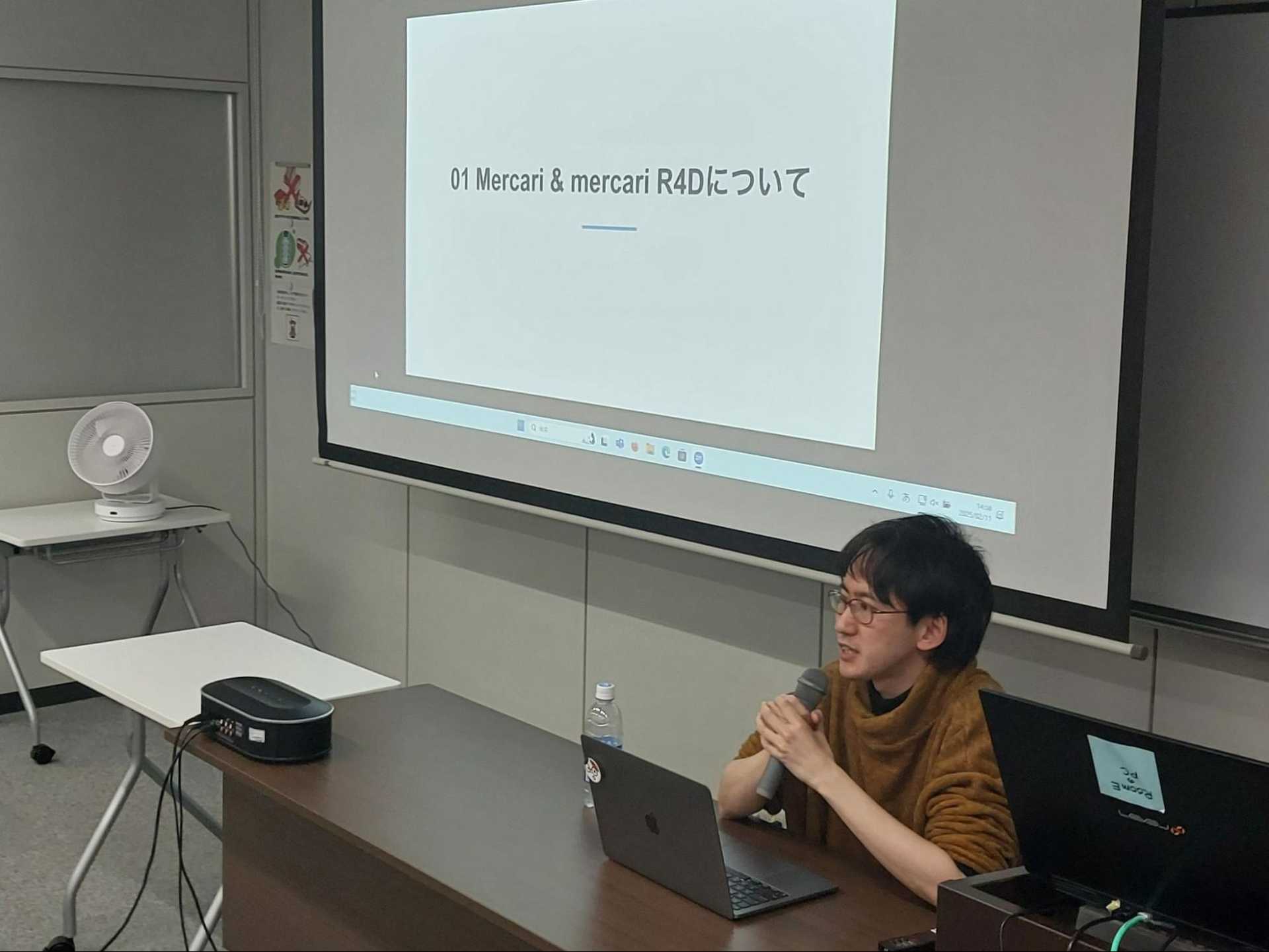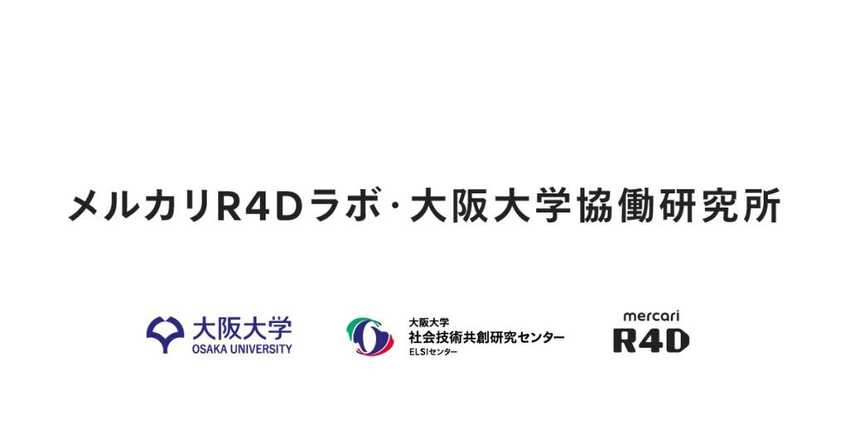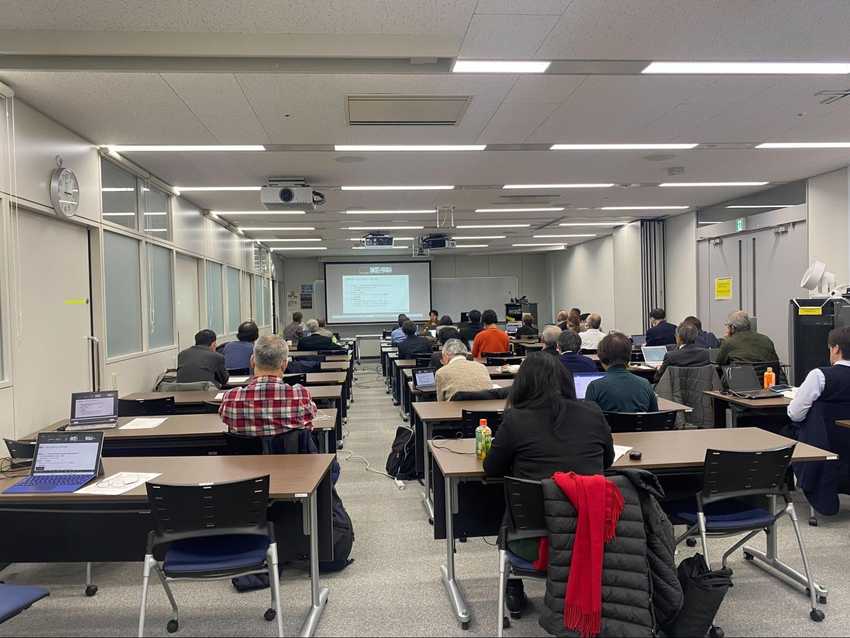Greetings! My name is Shoichi Fujimoto (@sho-1) from Mercari R4D’s Research Acceleration Team.
I was invited to speak at an event held on Tuesday, February 11 at the JAIST Tokyo Satellite Campus titled, “Next-Generation Recurrent Research/Education Symposium:” Looking at the Last and Next 20 Years of JAIST Recurrent Education.
In the first half of my presentation, I talked about Mercari R4D (“R4D”) initiatives, particularly the Mercari R4D PhD Support Program. In the second half of my presentation, I talked about my experience with the broad aspects of recurrent education through our joint research with the Osaka University ELSI Center.
In this article, I’d like to give a summary of what I delivered at the lectern and share some of the comments I received from the audience.
Event overview
- Presentation title:
- Leveraging Mercari’s PhD Support Program—An Initiative Focused on R&D Organization Mercari R4D
- Speaker:
- Mercari R4D Research Administrator Shoichi Fujimoto
- Date and time:
- Tuesday, February 11, 2025, 10:00 AM–5:00 PM
- Venue:
- Held in person at JAIST Tokyo Satellite Campus (a five-minute walk from the Konan Exit of Shinagawa Station) and broadcast online (via Zoom)
- Official website (available only in Japanese):
About the Mercari R4D PhD Support Program
Origins of the Mercari R4D PhD Support Program
In January of 2022, Mercari launched the Mercari R4D PhD Support Program, our effort to help our employees in their pursuit of a doctoral degree.
At other companies and organizations, programs like these are operated mainly by HR in order to support the growth and shape the careers of employees, and in many cases the employer dictates the areas of study and research topics. However, at Mercari, we have positioned our support program as a crucial part of research and development at the company. Two things make our program different from the rest. The first is that it is operated by R4D, our research and development organization, and the second is that the organization does not restrict the research topics or areas of study that PhD candidates pursue.
Establishing a company program that supports employees through the years-long journey needed to obtain a doctoral degree is also a very challenging initiative. Mercari is a comparatively young company—having just celebrated its 12th anniversary in February of 2025—and the tech industry is said to have a high rate of employee turnover, with some people changing jobs every three to five years. With this as a backdrop, Mercari’s values and R4D’s mission figure in the background of what led to R4D offering a PhD support program with no restrictions on research topics.
The Mercari values and R4D mission supporting the Mercari R4D PhD Support Program
“Go Bold” is held as one of Mercari’s values. In order to create innovation with a big impact on the world, we recommend that all of our members take on bold challenges and learn from failure. Therefore, when faced with the challenging initiative of the Mercari R4D PhD Support Program, we adopted a ‘let’s start by giving it a try’ mindset, which allowed us to make the bold decision to launch the program.
In addition, Mercari prizes Inclusion & Diversity for our members as a foundation that supports the values of our organization. With this program, we expect to further diversify our expertise and workstyles as well as reinvigorate our organization by opening our talent pool to working professionals who are also engaged in university studies.
The background of the program’s practice of not questioning the fields of research topics that members choose can also be traced to R4D’s mission, “pioneering the path toward undiscovered value.” This mission transfers well to Mercari Group’s mission to “circulate all forms of value to unleash the potential in all people.” The world that this mission is aiming to realize is very broad. It demands that we face complex issues that cannot be resolved by any single research area.
Therefore, at R4D, we made our mission “pioneering the path toward undiscovered value” for Mercari and society. So far we’ve made efforts to partner with industry and academia on a variety of research and development topics encompassing everything from the natural sciences to the humanities and social sciences. Our research and development topics include human-computer interaction (HCI); accessibility; blockchain technology; quantum computing technology; ethical, legal, and social issues (ELSI); and communication.
With all of this in mind, the program is designed to allow members to freely propose issues that they encounter in their work as their research topic as a working adult PhD student, with no restrictions on their fields of study. Through this program, R4D is also able to obtain knowledge of new research fields, expand our network of researchers, and create opportunities for the worlds of research and business to come together.
What the Mercari R4D PhD Support Program offers
This program mainly provides three streams of support:
- Financial assistance for entrance and tuition fees required for PhD programs
- Flexible workstyles that accommodate such things as leave and a three- or four-day workweek
- Consultation with R4D on research topics
R4D possesses the knowledge and knowhow to use Mercari’s data in research and a program for research and development ethics reviews. It also utilizes these to support PhD research. In addition, R4D members have access to a variety of research networks that they can consult to help them find a university, even while their research plan is not fully formed and before they know where they would like to study.
R4D would like to take the lead of an innovation ecosystem and establish partnerships between industry and academia by demonstrating that it’s possible for PhD students and doctorate holders to thrive in the private sector.
Reactions to the presentation
Attended by an audience of about 100—mainly JAIST researchers and working adults who are also students—the presentation brought together professionals specializing in innovation theory, technology management, and education for working adults. This event was so much more than an opportunity to introduce the activities of R4D. It also gave us a chance to speak with people who are interested in partnerships between industry and academia, recurrent education, and other such topics.
I was grateful to see Mercari’s initiatives draw a lot of attention, and we received a lot of questions and comments after the Q&A session and event concluded. Two things that particularly stimulated discussion were 1) our practice of allowing individual members to propose research topics and 2) the value of this system.
1) The practice of allowing individual members to propose research topics
We received a comment that very few companies with PhD support programs have such a hands-off attitude when it comes to specifying areas of research or research topics to program participants, and that our practice of not specifying research topics is itself the embodiment of R4D’s mission of “pioneering the path toward undiscovered value.” We also received praise regarding our members setting their research topics based on their individual or intrinsic motivation. We were told that “research does not always go according to plan, and serendipity is an important element of the process. Therefore, this robust approach, which allows researchers to take a seemingly roundabout path, is excellent for truly grasping the nature of research.”
2) The value of this system
At Mercari R4D, we don’t just slot in a certain number of PhD program participants as a KPI. Acquiring a PhD and achieving success following this accomplishment is of course important, but beyond this, we believe there is value in the very act of taking on higher studies. For example, the knowledge and experience that a working-adult PhD student gains from higher studies also spread to other members through their daily work (knowledge spillover effect), and they stimulate curiosity and ambition. I’d also like us to promote partnerships between industry and academia with Mercari’s members pursuing PhDs acting as hubs between Mercari and universities. The symposium audience praised us as progressive for focusing not just on what is obtained, but on the process by which people go about pursuing their doctoral degrees.
Other than this, one person commented that they were impressed since they thought Mercari was just an e-commerce company and did not know that there was an advanced research and development organization called Mercari R4D.
The broad aspects of recurrent education
My experience with the broad aspects of recurrent education
The topic of this year’s symposium was “recurrent education,” and so in the second half of my presentation I talked about my experience with the broad aspects of recurrent education. Sometimes confused with “recurring,” the word “recurrent” means “returning or happening time after time” (https://www.merriam-webster.com/dictionary/recurrent). In the context of recurrent education, this translates to going back and forth between work and education.
Right before my presentation, Kichiro Inui, of educational materials company Recruit Souken Shingaku, delivered the following three statements:
- “Recurrent education is more than just engaging in studies. There are a variety of learning opportunities.”
- “Don’t think of recurrent education as relearning something, but rather compounding your learning.”
- “Recurrent education is engaging with people you would not meet in your daily life and with strangers who are foreign to you.”
In my talk, I mentioned that I had also just been thinking about the broad aspects of recurrent education from the perspectives of the knowledge spillover effect (transmission of knowledge) and inclusive innovation. I’d like to think I was able to present a few modest examples that complemented the content of Mr. Inui’s presentation. As mentioned earlier, the studies of a working-adult PhD student don’t just benefit the student, but also the people they interact with. Specifically, the spillover of knowledge to the members on their team and to the rest of R4D, as well as the presence of diverse members on their team, provide stimulation.
I’ve also experienced the broad aspects of recurrent education through R4D’s diverse partnerships with industry and academia. One example that I’d like to raise here is the establishment of a joint research laboratory with Osaka University.
On January 30, R4D published the following press release.
I would like to thank the many people who have been involved in developing what has ultimately grown into a large program from what was originally a small joint partnership between industry and academia that sprang from a 2020 feasibility study.
In the beginning, this was a small joint-research feasibility study to revise our research and development ethics guidelines to enhance R4D’s ethics review process (see press release issued June 30, 2021: Mercari Publishes Proprietary Ethical R&D Guidelines Based on Joint Research with Osaka University’s ELSI Center).
After that phase was over, we stepped up our efforts into full-blown joint research, adding such things as technology assessments for R4D research and development projects and research topics exploring various ELSI issues across Mercari Group.
While leading the work spanning the launch of this joint research to the stepping-up process, I learned firsthand through discussions with ELSI Center researchers about the concepts, attitudes, and perspectives of ethics, philosophy, and cultural anthropology, and also learned about responsible research and innovation (RRI). As a student, I majored in science and technology studies, but I think the process we used here was truly one form of the broad aspects of recurrent education in which you shift back and forth between working and learning.
Under this joint research, team members from numerous divisions and teams within Mercari Group had opportunities for discussions and interactions with ELSI Center researchers. Through this process, I think a range of members working at Mercari, members of R4D, and the researchers from the ELSI Center were able to learn a lot about ELSI theories, real-world examples, and practical applications. At private-sector companies, I think it’s probably rare to see the abbreviation “ELSI” known as widely as it is at Mercari.
I also think our initiative may have become a real-world example of talent development being an expectation of partnerships between industry and academia, which is something that Ministry of Education, Culture, Sports, Science and Technology (MEXT) official Shuichi Sakamoto talked about at the symposium.
Panel discussion
A panel discussion followed my presentation.
In the panel discussion, the following question was asked: “It’s generally considered difficult to come up with topics for industry and academia partnerships in the humanities and social sciences. How have you come up with topics at R4D?”
Not limited to this particular case of joint research, I think I excel at what I call “joint research matchmaking:” asking around the company about the issues teams have while thoroughly asking each and every one of the university researchers about their interests, and then diligently arranging opportunities to match two parties. Some of these matches have gone on to bear fruit.
At the event, one person commented, “With many companies there is no way to even get started unless the projected results are clear, so it’s great to see such thorough attention being paid to coming up with topics. Speaking as someone on the university side of things, I really appreciate this.”
Conclusion
This panel discussion reaffirmed for me that events like these are themselves valuable opportunities for industry and academia partnerships. Industry and academia partnerships do not necessarily entail a company and a university signing a contract for joint research. The first step is for people to get to know each other. Through my presentation, the audience became interested in Mercari’s activities, and I was simultaneously able to reaffirm where our strengths and value lie. It was also an opportunity for me to learn about a variety of initiatives at universities. I would like this event to foster a variety of partnerships going forward.
Also during the panel discussion, there was a point raised that the universities are not just for churning out doctoral graduates. It was said that the universities should have a new reason for being: “University as a Service.” This would entail fulfilling a role that involves how graduates use their acquired knowledge after graduation and how they contribute value to society. I look forward to the further development of new industry and academia partnerships, and I would like to work together on an approach that will excite both business people and academics.
Finally, I’d like to say that this symposium was an especially happy event for me personally because it was attended by three of my senior colleagues. Joining the symposium was Dr. Sengoku, with whom I went to high school, and Dr. Shirahada who was in my university seminars. Joining online to ask questions was Dr. Itaya, whom I also know from my university seminars. I’d like to end by saying thank you to the symposium organizers for inviting me!
Read more about the Mercari R4D PhD Support Program in the articles below.
- Elephant Career Publishes Interview Article on the “Mercari R4D PhD Support Program” for Supporting Employees in Obtaining Doctorate Degrees
- Mercari Introduces the “Mercari R4D PhD Support Program”, a System that Supports Employees in Obtaining Doctorate Degrees
- The 1st round of the PhD Support Program has been decided!
- The 2nd round of the PhD Support Program has been decided!
- The 3rd round of the PhD Support Program has been decided!
- ITmedia Publishes Interview Article on the “Mercari R4D PhD Support Program” for Supporting Employees in Obtaining Doctorate Degrees


